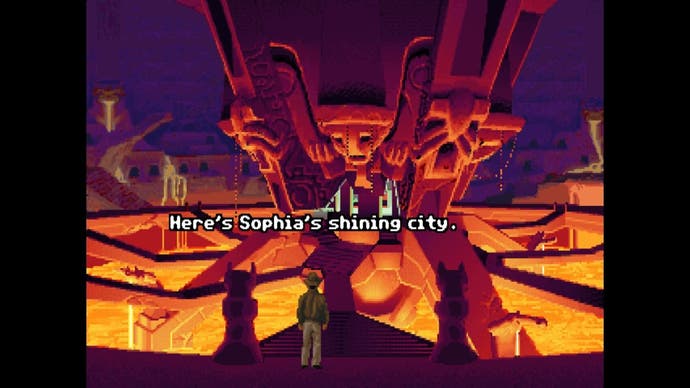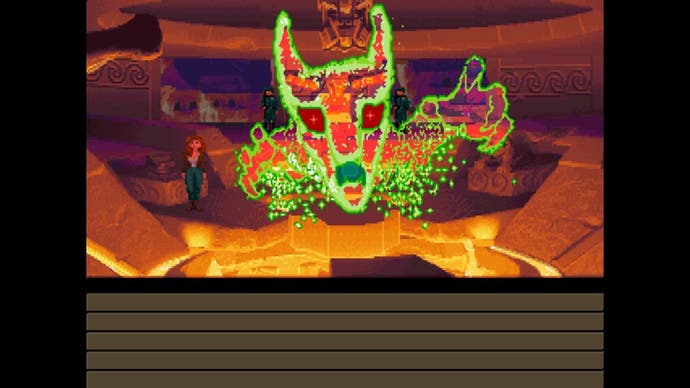Retrospective: Indiana Jones and the Fate of Atlantis
The retro path.
So during that sequence where you return to the university buildings and attempt to climb your way back up the floors Indy previously crashed through, I was feeling smug. I never remember what happens in games years on, and yet for once I knew the solution to the puzzle. Get the arrowhead, use the cloth, and unscrew the back of the bookcase. Then you can knock the book down, and you've got the Lost Dialogue Of Plato.
Except it didn't work. Wrong book. But then I remembered! Melt the wax cat. Except, it contained nothing. Instead I had to get the gross mayonnaise from across the road to grease the statue to slide it across the floor to get to the attic to find the key to unlock the chest.
Placedropping
There are some puzzles here that don't make a lot of sense once you've figured out/looked up the solution. But they're few. Compared with The Curse of Monkey Island, which I looked at last week, they are a masterclass in how to design adventure puzzles.
It's extraordinary to learn how small a team made this game. Most of the LucasArts regulars were on The Secret of Monkey Island or The Dig at the time. The lead on this one was Hal Barwood, a film writer and producer who brought a considerable range of skills to the project. He worked on almost every aspect, including writing the splendid script.

Fate of Atlantis is not an overtly comedy game, as many of LucasArts other projects obviously were. But it is still constantly entertaining, with some lovely banter between Jones and Hapgood. The script was so strong, in fact, that many tipped it many times as the plot for the mythical fourth movie. Oh, if only it had been.
Forgive me a ghastly name-dropping anecdote, but I'm old and you can't stop me. A few years back I was lucky enough to be visiting George Lucas's Skywalker Ranch, the workplace of many LucasFilm/LucasArts scriptwriters. And we peeked into the extraordinary redwood circular library, with its vast stained glass domed ceiling, spiral redwood staircase, and walls lined with tens of thousands of books. It truly is an extraordinary sight, and it's the place where Barwood researched the plot for this game. It's the place where Lucas's scriptwriters research the plot for all his projects. And when I went inside, the tables were spread with books about 1950s, and mysterious items. They were planning the new Indy film, and while it had yet to be announced, looking at those tables I knew.
If I'd known what they were planning, I'd have accidentally crashed into the table while lighting a match, and while a beautiful room of wonderful books would have been tragically lost, I think it would have been for the greater good.
Orichalcum in a minute

Barwood's efforts were much better applied. Atlantis myths offer huge stretches of possibility, and the game makes a special effort to include a lot of real-world information on the subject. Taking inspiration from Plato and Ignatius L. Donnelly (thanks Wikipedia), embracing the myths but then making them slightly more fantastical, makes for excellent gaming.
The game's final act, set in the three concentric circles of Atlantis, are especially splendid. Puzzles wrapped in puzzles, mixed in with Sophia's gradual decline into possession, on a grand scale. While it would have been a good idea if the game could have at least hinted to you that you need to pick up every single object you've used on the way, or you'll be painfully backtracking all over the place (stones, ladder, wheel, pole...), it feels like such an epic sequence, leading to a decent climax.
It's lovely, I think, that the ending is all based on talking your way out of trouble. Or indeed into it. Perhaps that conversation is a little scrappy - the route to success certainly doesn't make as much sense as it could - but it remains a fitting finish.
In the end, against the odds, it was the better game of the three LucasArts were making at the time. And it's one that certainly merits a return visit. It comes with the Wii release of Staff of Kings, and is also on Steam for the PC.








